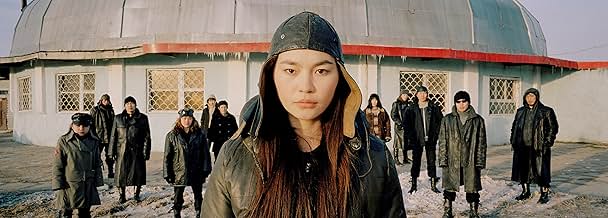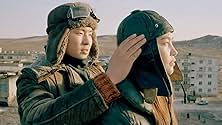Füge eine Handlung in deiner Sprache hinzuSet in the frozen steppes of Mongolia, a young nomad confronted with his destiny after animals fall victim to a plague which threatens to eradicate nomadism.Set in the frozen steppes of Mongolia, a young nomad confronted with his destiny after animals fall victim to a plague which threatens to eradicate nomadism.Set in the frozen steppes of Mongolia, a young nomad confronted with his destiny after animals fall victim to a plague which threatens to eradicate nomadism.
- Regie
- Drehbuch
- Hauptbesetzung
- Auszeichnungen
- 16 Gewinne & 5 Nominierungen insgesamt
Empfohlene Bewertungen
I'd like to share my positive impressions from this movie. I've just seen it on Sofia Film Festival and I find it truly amazing. It deals with some topics about life and humanity in totalitarian Soviet-dominated societies - in a way that is both just and powerful. Being a Bulgarian that have witnessed totalitarian rule's disregard for the human individual - I find this movie a powerful reminder of how vital yet fragile our relations to nature and traditions are. Acting is brilliant - especially the lead character. There is a well done balance of landscape, color and contrast that make this movie visually outstanding. What did put me off a bit - and made me reduce my vote to a 8/10 mark - were a couple of scenes at the end of the movie that, though meaningful and powerful, do brake the overall balanced and well-programmed dynamics of the whole movie - and i think that if they were cut out - it would only have improved and boosted this movie's basic messages to the viewer... I find this line in the synopsis "animals fall victim to a plague which threatens to eradicate nomadism" irrelevant, misleading and diminishing authors' main ideas... Overall - a great movie...
I saw a screener DVD of this, but would love to see it on the big screen. A heartbreaking story of the nomadic peoples of Mongolia being forced to abandon their homes due to a "plague" outbreak among animals. Despite their own herds being healthy, the family who is the focus of the beginning of the film are forcibly moved to a mining town, where their son Bagi, who has visions of his ancestors is forced to work for a pittance. Other nomads have been detained for offenses like playing music publicly. The only food available seems to be potatoes, but there appears to be meat available on the black market, and this feeds speculation that the clearances were not motivated by animal sickness after all. Bagi is arrested and while in the detention center meets a group of young activists who want to rebel against their unlawful imprisonment, and to free the animals they know are still alive. The song they perform is a high point of the film, and adds to an already excellent score and soundtrack.
This story does not have an entirely happy ending, but there is some measure of hope and redemption here. The film's strength lies in its very simple visuals and minimal dialogue, which powerfully portray a way of life that is dying out due to government interference.
This story does not have an entirely happy ending, but there is some measure of hope and redemption here. The film's strength lies in its very simple visuals and minimal dialogue, which powerfully portray a way of life that is dying out due to government interference.
Excellent film. It's visually sublime, very spiritual and incredibly stirring. Admittedly, the long, quiet shots resemble Jia's cinema, Byambasuren's semi-documentaries and even Tarkovsky, but it doesn't curtail the power of the images one bit. Those are shots of a faraway, hence fascinating world (Inner Mongolia) where the people have a way rougher ride than us Central Europeans - we who are living in a "well organized" society. I don't mean those who still live under same conditions as their ancestors thousands of years ago. They seem to be perfectly happy, much more than us. I mean those people who are forced to adjust to a system they don't know and where they either stand or fall. Most of them fall once they are robbed of their lives with all that's left is emptiness and boredom. The film is about the loss of the spiritual soul, about cutting off roots and about ruining ancient cultures. There is just one little objection: Maybe it would have been more effective if a local had made the film instead of Europeans, because this way it remains to be a view from the outside.
I have just seen this film, and my opinion of it is mixed.
On the one hand, the film gives a detailed and intimate view of Mongolian life, especially in the first part; moreover, there is a strong political message behind it, which leads to some disturbing and powerful images (nothing too shocking).
On the other hand, everything is filmed in such a tediously slow manner that it becomes either mesmerizing or simply boring. Unfortunately, in my case, the whole audience including myself were not mesmerized. Moreover, toward the ending, the film becomes more and more surreal, which for me personally did not lead to a satisfied feeling at the actual end.
All in all, if you enjoy watching empty lands and silent people for a long time, you may be able to enjoy the positive aspects of this film. If, like me, you like films with at least the outline of a well-defined story and the feeling that you somehow understood what you just saw, this might not be the film for you.
On the one hand, the film gives a detailed and intimate view of Mongolian life, especially in the first part; moreover, there is a strong political message behind it, which leads to some disturbing and powerful images (nothing too shocking).
On the other hand, everything is filmed in such a tediously slow manner that it becomes either mesmerizing or simply boring. Unfortunately, in my case, the whole audience including myself were not mesmerized. Moreover, toward the ending, the film becomes more and more surreal, which for me personally did not lead to a satisfied feeling at the actual end.
All in all, if you enjoy watching empty lands and silent people for a long time, you may be able to enjoy the positive aspects of this film. If, like me, you like films with at least the outline of a well-defined story and the feeling that you somehow understood what you just saw, this might not be the film for you.
The reviewer of this film from Holland provides an excellent perspective of this film as an experiment in art. As an anthropologist familiar with Mongolian nomadic culture and the historical background of the horrible collectivizing results of the Maoist government of the PRC on the population of inner Mongolia where thousands died due to the heavy handed and incompetent Maoist policies, I can certainly relate to the subtext of the story of Khadak. As a film, the organization of the storyline leaves much to be desired and does have an amateurish feel to it. However, the portrait of the Mongol people in this film against the bleak background of the steppes where they've lived for centuries and the shoddy, bleak living complex and mining facility to where they've been relocated, is quite striking. The faces of the actors in long and short still shots adds to this effect. Personally, I find the Mongols to be a strikingly beautiful people with a unique history ranging from great conquest to severe abuse under both Chinese and Soviet hegemony. In this context, I find this little film to be quite good in spite of its shortcomings.
Wusstest du schon
- PatzerIn the shots where the Shamaness is smashing the liquor bottles on the ground, several of them bounce, or just break into a few pieces, but the sound effect is still that of a bottle shattering to bits.
- SoundtracksMother Mongolia
Written by Altan Urag
Performed by Altan Urag
Top-Auswahl
Melde dich zum Bewerten an und greife auf die Watchlist für personalisierte Empfehlungen zu.
Details
- Erscheinungsdatum
- Herkunftsländer
- Sprache
- Auch bekannt als
- Khadak - Die Farbe des Himmels
- Drehorte
- Produktionsfirmen
- Weitere beteiligte Unternehmen bei IMDbPro anzeigen
Box Office
- Budget
- 3.000.000 € (geschätzt)
- Bruttoertrag in den USA und Kanada
- 3.139 $
- Eröffnungswochenende in den USA und in Kanada
- 1.983 $
- 14. Okt. 2007
- Weltweiter Bruttoertrag
- 37.781 $
- Laufzeit
- 1 Std. 44 Min.(104 min)
- Farbe
- Sound-Mix
Zu dieser Seite beitragen
Bearbeitung vorschlagen oder fehlenden Inhalt hinzufügen











